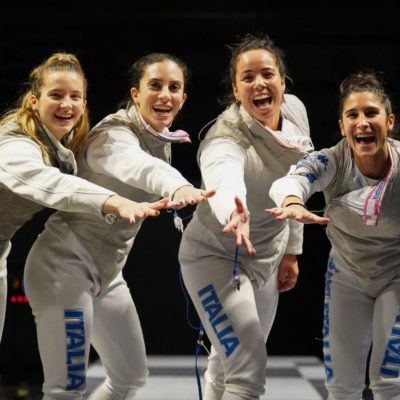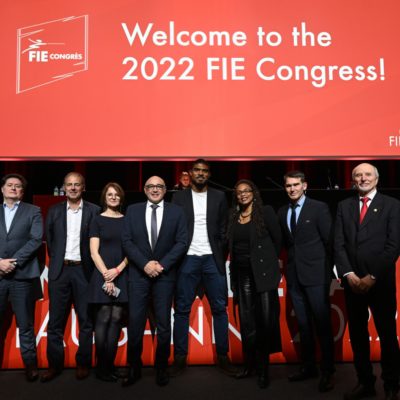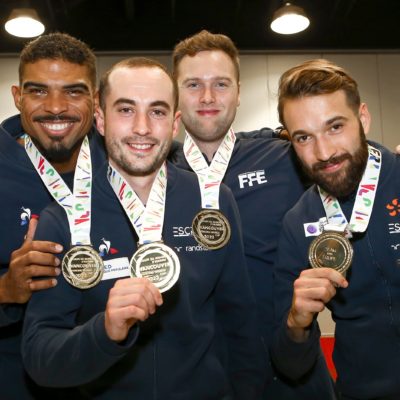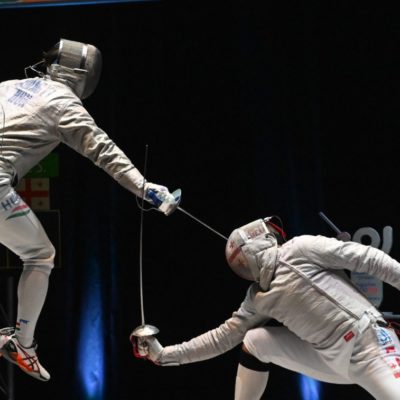Listen in, grab a Coke and some Chicken McNuggets and learn more about the state of the US Team.
Full Transcript:Serge Timacheff: I’m in Rio De Janeiro at the Pan American Games with Jim Carpenter of the U.S. Fencing Association, and Jim, I understand that you have a new role as we go toward St. Petersburg and on to The Olympics.
Jim Carpenter: That’s correct. I’m taking Jim Page’s place as the Director of High Performance for the U.S.F.A.
ST: And what does that mean exactly?
Jim Carpenter: That means I’m basically in charge of getting us medals, and I’ll be in charge of the national coaches, making sure their programs are moving us in the right direction, and my actually major role will be as chief liaison to the USOC (US Olympic Committee) from the U.S.F.A.
ST: How does that work?
Jim Carpenter: Basically, any communications we have between the U.S.F.A. and the U.S.O.C., I’m the point man on that. So, when it comes to getting more money for our fencers, when it comes to getting more support for our fencers, any of that sort of thing, it’s my job to deal with U.S.O.C.
ST: I think a lot of people in the fencing community don’t have a good understanding of how the U.S.F.A. fits in with the U.S.O.C., and what kind of a governing body the U.S.O.C. is over the U.S.F.A. What kind of control do they have over us, and what kind of involvement do we have with them?
Jim Carpenter: Well, the U.S.O.C., we’re fairly autonomous. They’re basically a support organization for us, but they also – if they’re extremely dissatisfied with how we’re running, they can actually disband the U.S.F.A. as an N.G.B. So, it’s very important for us to keep a very positive relationship with the U.S.O.C. No. 1, so that they don’t want to disband us as an N.G.B., and No. 2 –
ST: And an N.G.B. is a national governing body, right?
Jim Carpenter: That’s correct.
ST: Correct.
Jim Carpenter: And No. 2, we really rely a lot on their support. They support us very heavily financially, and it’s a very important part of our international team’s funding, getting that money from the U.S.O.C.
ST: So, the overall U.S.F.A., a significant portion of it comes from the U.S.O.C.?
Jim Carpenter: That’s correct.
ST: And where does the U.S.O.C. get their money?
Jim Carpenter: From private sponsors. You see, it’s Coca-Cola, UPS, McDonald’s, you see those signs all over The Olympic Village, all over The Olympic Training Center, those are the sponsors. It’s all private money that funds the U.S.O.C. It’s not government money, which a lot of people think it is.
ST: Well, and that’s certainly true in other countries.
Jim Carpenter: That is, absolutely, but that’s the way the United States works, private – done privately versus the state run organizations of other countries.
ST: So, I guess, in the past we’ve seen on the U.S.F.A. website, we’ve seen sponsors like United Airlines, and McDonald’s, and things like that, but we don’t necessarily see those vendors or those companies represented at our national events, but it’s because it comes through the U.S.O.C. that they appear there. And I guess to some degree we have that money coming in from them, but we don’t, as a fencing community, necessarily see it so prominently.
Jim Carpenter: That’s correct, but that money that the U.S.O.C. gives us is directly from all those sponsors. So, you don’t realize it, but Coca-Cola and McDonald’s is a significant supporter of United States Fencing.
ST: And is the money that they give us, does it mostly go to the high performance activities, or is it spread out into other areas as well.
Jim Carpenter: Well, I mean, it all comes into one budget, and the money gets – between the money the U.S.O.C. gives us and the money we generate ourselves, it becomes one large pot of money, and then that’s budgeted where it’s needed.
ST: And what percentage of the whole U.S.F.A. budget comes from the U.S.O.C.?
Jim Carpenter: The exact percentage, I’m not sure of, but it’s a good solid amount of funding.
ST: How is the team doing?
Jim Carpenter: As far as – ?
ST: Just in general and our preparations for St. Petersburg and then on to Beijing.
Jim Carpenter: I’m very excited about our team right now. We have most of our teams right now are ranked in the top eight in the world standings, and the top eight is the requirement for qualifying for The Olympics. We have a lot of fencers in the top ten in the FIE (international) point standings, and we have a lot of individual results that if we replicate those results at The Olympics will result in medals. And of course, our Women’s Sabre program is doing fantastic, and I don’t think I really need to say much more about how well they’re doing.
ST: And so what are the areas that you really do you think that need to be concentrated on the most? Where are your areas of focus for the next several months that really need to be beefed up or need attention?
Jim Carpenter: Well, basically, just keep an eye on ball, and you know, getting our teams as well prepared as possible for Beijing, and all that really means is keeping things moving in the right direction, which they already were with Jim Page, and continuing to try and get as much support from the U.S.O.C. as we can.
ST: And I understand that you’re a fencer, and I know a lot of people see you around the different competitions, but you’re kind of a quiet person, so not everybody necessarily knows your background. Maybe you can tell me a little bit about your background as a fencer and your qualifications, and also for this role that you have.
Jim Carpenter: Well, I consider myself a recreational fencer now. I wouldn’t consider what I’m doing highly competitive fencing anymore, but I was on the ’96 Olympic Team, and I made three or four World Championship Teams, a couple Pan Am Teams between 1988 and 1996, and –
ST: And that was in Épée?
Jim Carpenter: That’s correct, Épée, yes. So, and now after ’96 I retired for awhile, and then 2002 I started coaching, and now I have four or five fencers actually in the top ten point standings as a coach.
ST: Who are they?
Jim Carpenter: The French sisters, you might have seen Christa and Kelly French, Brent Talley, Jacob Osborne, and Gyen Stefan.
ST: And where is your club?
Jim Carpenter: My club now, I actually just moved up to New Jersey in January, so my club was the Gold Blade Fencing Center in South Lake, Texas, but now I’m with the Atlantic Fencing Academy in Colts Neck, New Jersey.
ST: And so, your role though now as the Director of High Performance, so tell me a little bit about the shift from being a coach to being in that role.
Jim Carpenter: Well, the biggest change has been, you know, right now it’s a much more indirect influence over fencers. Where as a coach, it was always one on one, and you had direct impact on each fencer’s performance. Now it’s more of an overall impact, where I’m responsible for getting as much funding as possible for our fencers, and getting the environment and the situation in as an ideal of a possible – an ideal of a situation to have the most beneficial impact on their performance.
ST: Are you involved in actively seeking sponsorships for fencers?
Jim Carpenter: No, primarily it’s through the U.S.O.C.
ST: But some fencers are, in fact, looking for sponsors on their own. Would that not be – ?
Jim Carpenter: It’s actually on my list as an important thing to try and find other areas of funding if possible, but I actually haven’t – I’ve only been doing this for a couple months, so I haven’t really gotten – I haven’t started moving forward on any of that yet.
ST: I suspect the expenses involved with getting these athletes all around the world on a frequent basis to keep their point standings up is not insignificant.
Jim Carpenter: Oh, it’s – I mean, it’s actually mind boggling when you think about you sending four or five athletes to Grand Prix competitions all around the world. Some of them are in Asia. Some of them are in Africa, and it’s really a staggering amount of funding that’s required to keep the team going.
ST: And between now and Beijing, what kinds of things are we gonna have to see happen in order to ensure that our athletes are properly funded and are in their best shape possible for those games? So they don’t have to worry about anything except fencing.
Jim Carpenter: Well, I’d love to be able to guarantee that they’re not gonna have to worry about anything except for fencing, and I’m gonna do my best to make that happen, but it’s gonna be very difficult to get everyone all the funding they need to fence at their highest level. But that’s my job, and that’s what I’m gonna try and accomplish as much as possible.
ST: Is there any way that the average member of the U.S. Fencing Community, other than paying their dues, can help contribute to this effort?
Jim Carpenter: Oh, absolutely. Anyone at any time can make a donation to the United States Fencing Association, and they can actually earmark it towards the programs that they want to specifically support.
ST: Can they earmark it for a specific athlete?
Jim Carpenter: No, not a specific athlete, but they can do specific weapon squads. So, I’d have to actually check on that to make sure that, you know, all the, you know, ‘cause that gets into a very difficult area about what’s tax deductible, what’s not tax deductible, and how that impacts the athletes, especially when you’re talking some of them are NCAA (collegiate) athletes. So, it’s a not a black and white thing, but definitely they can do the weapon squads, and if anyone would like to sponsor one of our athletes directly, certainly contact me, and I’m sure we could work something out.
ST: And I guess some of the athletes are falling under the NCAA restrictions as well, correct?
Jim Carpenter: Absolutely, and that’s dealing with a very strict organization, and the last thing we ever want to have happen is that someone lose their NC2A status over a funding issue like this, and especially if that impacts their scholarship.
ST: Right. I’m sure not all people in the fencing community really understand why fencers are subject to the same standards and restrictions of sponsorship that, say, a college football player would be, but that’s kind of the way it is, right?
Jim Carpenter: You’re preaching to the choir. It doesn’t make any sense to me either.
ST: So, going forward here, break it down just a little bit more between the groups of fencers we have. You’ve mentioned Women’s Sabre, and how is Foil doing?
Jim Carpenter: Well, Women’s Foil is starting to really come along. They actually just moved up into – they’re now first place in the zone, and if they have a good performance in the Zonal Championships coming up in August, they should seal up an Olympic spot for the team.
ST: Where are the Zonal Championships?
Jim Carpenter: They’re in a resort town north of Montreal. I can’t come close to actually pronouncing the name of the place.
ST: And so that’s Women’s Foil.
Jim Carpenter: Right. So, Women’s Foil is looking good, and they’re just getting better and better. They’re really coming together as a team.
Men’s Épée, I’m very excited with and the Grand Prix they just recently had in Montreal, they took the silver medal. They beat France and Russia on the way to the silver medal, and they lost to Italy in overtime. So, if they have a performance like that at The Olympics, they really have a good shot at a medal.
And then Men’s Sabre’s coming together. They’re looking good. Very likely that they’ll qualify the team.
Women’s Sabre, obviously, is looking great. They’re the No. 1 team in the world, top three fencers in the world.
And what does that leave us? We got Men’s Foil, very good chance we’ll, you know, there’s no Men’s Foil team, no Women’s Épée team, but we have several very good individuals that should probably qualify.
So, that’s Men’s Épée, Women’s Épée, Women’s Sabre, Men’s Sabre, Men’s Foil. Yeah, so that covers the bases.
ST: You got it covered, but which is really the one that’s the closest one right now that could perchance not make it? Which one of those teams is sort of on the line the most?
Jim Carpenter: I would say – I’d say it’s all kind of equal. I’d say they all have an excellent chance of doing it. I would actually be more surprised if those teams don’t qualify, but it’s always a tough battle, but I’d say it’s about an even shot for all of them.
ST: And within our zone, who are the strongest ones: Canada, Cuba, Venezuela, who else?
Jim Carpenter: Well, for example, in Men’s Épée, Venezuela is coming along, they’re coming along very strong. Cuba’s always strong in everything. Even when we’re better than them, they’re never a pushover, and the same with Canada. It’s like they’re always coming up with tough teams. So, it’s not gonna be a cakewalk that’s for sure.
ST: Have you seen any surprises this year?
Jim Carpenter: How do you mean surprise?
ST: In terms of countries or individuals who you might not have suspected doing as well as they’re doing, and all of a sudden they’re contenders against it?
Jim Carpenter: Well, I would say Venezuela’s a perfect example. I kept on thinking that any of their results were a fluke, and you know, I gotta tell you, I was just watching Ruben Limardo, their Men’s Épée. Been to the last couple of tournaments, and he’s the real deal. He’s no fluke at all. He’s actually a medal contender himself for Beijing.
ST: Right, but we saw him win the Junior World Championships in Linz a couple of years ago, and I guess here today in the eight, he took out Cody Mattern for the Pan Am Games.
Jim Carpenter: Yeah, I mean, I’ve seen a lot of Junior World Champions that haven’t been able to translate it into the Seniors, but this guy is definitely the real deal. He’s starting to make some real result in Seniors and he’s gonna be tough to deal with.
ST: Well, so what’s your forecast here for St. Petersburg and beyond then. Give us a little bit of a – if you’re gonna be a soothsayer, tell us a little bit about the future.
Jim Carpenter: How do you mean? What our results are gonna be?
ST: Yeah, what are the results gonna be?
Jim Carpenter: Oh, I don’t want to take the chance of jinxing us. So, I’m not gonna say anything there.
ST: What are you gonna be seeing in terms of competitions between now and St. Petersburg other than the Zonal’s that may affect it?
Jim Carpenter: There are a couple – there’s Zonal’s and World Championships are far and away the most important. We could almost have our spots all sealed up from Zonal’s and World Championship. Then after that there are a few more Grand Prix’s that will still count for a qualification, but that’s up until April. So, after that it’s all about seeding.
ST: A lot of people are saying that it’s going to be very difficult with the preparations, all the – just the administrative problems going to Russia for St. Petersburg with Visas, and travel, and expenses, and logistics over there. How is that shaping up?
Jim Carpenter: Well, yes, it will be complicated, but we got a top notch team, because we have Andrea Lagen and Corinne Greenman in the office, and they’re very experienced at this, and they do a top notch job. It will be difficult, but I fully expect them to get the job done and get it done well.
ST: Well, we’re looking forward to a great year ahead with some exciting action coming along, and good luck with your new role, and the best of luck with getting everybody to where they need to be for next year.
Jim Carpenter: Great. Thanks, Serge.
[End of Audio]





